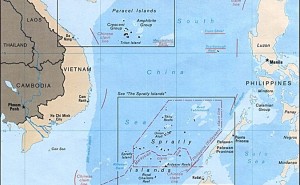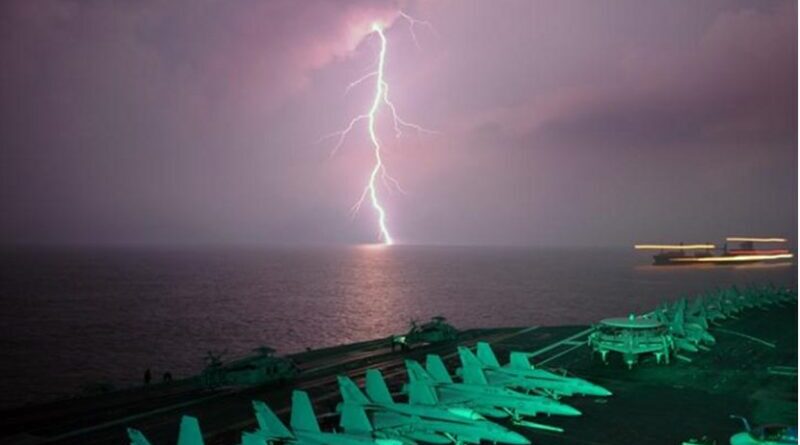Hotbed Of War III: South China Sea And Asia’s Cauldron – Analysis
By Osama Rizvi*
South China Sea is one of the most important regions of the world, geopolitically, strategically and economically. With an annual trade of $5 trillionpassing through the busy water body, it is natural for countries to drool over its possession and/or to gain influence. Vietnam, Malaysia, Brunei and Philippines are some of the contestants.
United States is backing them up. But China has already claimed it, turning a deaf ear to the orders by The Hague and international community (saying that the ruling was ill-founded). South China Sea represents a classic case of a region where the jostling between different countries can trigger a global conflict.
The history dates back to centuries. And all the parties have the ability to pull up thick dusty dossiers of evidences wherein the area, ironically, has been shown to be a part of that respective country.

Straits of Malacca is one of the most important gateways to enter the region, which in itself, is one of the most important “choke-points” of the world. Almost 60,000 vessels pass through the Straits annually also the tankers carrying 13 billion barrels of petroleum. The fish stock in the region may account for 10 percent of the global landed catch. In addition it has oil; and gas reserves.
Robert D. Kaplan in his book cum travelogue, Asia’s Cauldron, provides some interesting insights. Not many of us are aware of the muffled arms-race going in the region mostly under or not reported by the media. Vietnam, Philippines and China are experimenting with new submarines, weapons, missiles etcetera. Hidden underneath the friendly, tourist narrative, there is an insidious and precarious tussle for power and hunger for armaments. Another observation in this book is the way the writer has compared South China Sea with Caribbean. History is privy to the fact of how these Latin American countries/islands, to which the writer refers to Great Antilles, were exploited with the help of slaves and cash crops like tobacco, sugar, coffee etcetera provided the European nations with windfall profits.
An article in New York Times very pithily summarizes the thesis of the book mentioned above.
“The parallel Kaplan draws is straightforward and convincing. Between 1898 and 1914, the United States defeated Spain and dug the Panama Canal. This allowed Americans to link and dominate the trade of the Atlantic and Pacific Oceans, transforming the meaning of geography. “It was domination of the Greater Caribbean Basin,” Kaplan concludes, “that gave the United States effective control of the Western Hemisphere, which, in turn, allowed it to affect the balance of power in the Eastern Hemisphere.” In a rather similar way, he suggests, the South China Sea now links the trade of the Pacific and Indian Oceans; consequently, “were China to ever replace the U.S. Navy as the dominant power in the South China Sea — or even reach parity with it — this would open up geostrategic possibilities for China comparable to what America achieved upon its dominance of the Caribbean.” Because of this, the South China Sea is “on the way to becoming the most contested body of water in the world.”
“China’s position vis-à-vis the South China Sea,” he suggests, “is akin to America’s position vis-à-vis the Caribbean Sea in the 19th and early 20th centuries.”
Hence, what Caribbean was to US, is South China Sea to China. However, Chinese do not have a history of colonization. Also, in the contemporary world, they cannot exercise the said form of exploitation. But the building of an artificial island with a runway on it as well (according to satellite images) is too much a glaring threat to ignore. Add to this the multibillion dollar project which is part of Xi’s Chinese dream: One Belt One Road initiative and one can easily see Chinese ambitions for regional power.
Sea power has always been an important part of any country’s military strategy. While Britain and France in the eighteenth century can be compared to a whale and an elephant, China is accomplishing to be transformed into a formidable combination of both. Its OBOR plans to connect what is called the Eurasia, through maritime and landlocked routes. In this wake the control of South China Sea qualifies for a crucial and critical task. The Korean peninsula, Japan, magnitude of trade and Chinese mainland, all are located in the periphery of this region.the stakes are high. After all,“East Asia is all about trade and business.”
To conclude, in all these three parts we have wandered across the globe tracing out potential hotbeds of war. However, it will be instructive to note here that these are not the only one. The fact that war may be more likely to spur from these regions/countries is totally another argument. Since, the coming of nuclear weapons the world has been made safe anddangerous, both at the same time. If in one way nuclear weapons serve as a deterrent, due to its inherent destruction explained by the concept of MAD (mutually Assured Destruction), on the other hand it has also made vulnerable to a force whose destruction know no bounds. To add that these weapons are in the hands of humans, and humans by nature are often whimsical and erroneous, further aggravates our worries. Trump, Kim, or others of their ilk, they bear, not by the virtue of their character, but their positions, something that ought not to be under their influence.
It is impossible to obliterate the idea of war from this world. However, we can, by careful observation and analysis, trace out the potential war-zones and thereof act, preemptively to stop matters form being escalated, subsequently bursting into an “all-out war”. That is something nobody wants.
About the author:
* Osama Rizvi, Independent Economic Analyst, Writer and Editor. Contributes columns to different newspapers. He is a columnist for Oilprice.com, where he analyzes Crude Oil and markets. Also a sub-editor of an online business magazine and a Guest Editor in Modern Diplomacy. His interests range from Economic history to Classical literature.
Source:
This article was published by Modern Diplomacy

